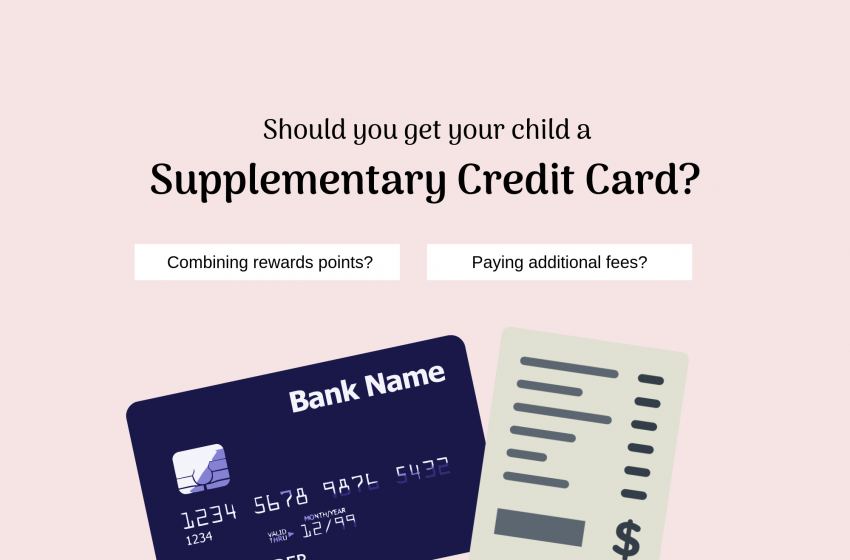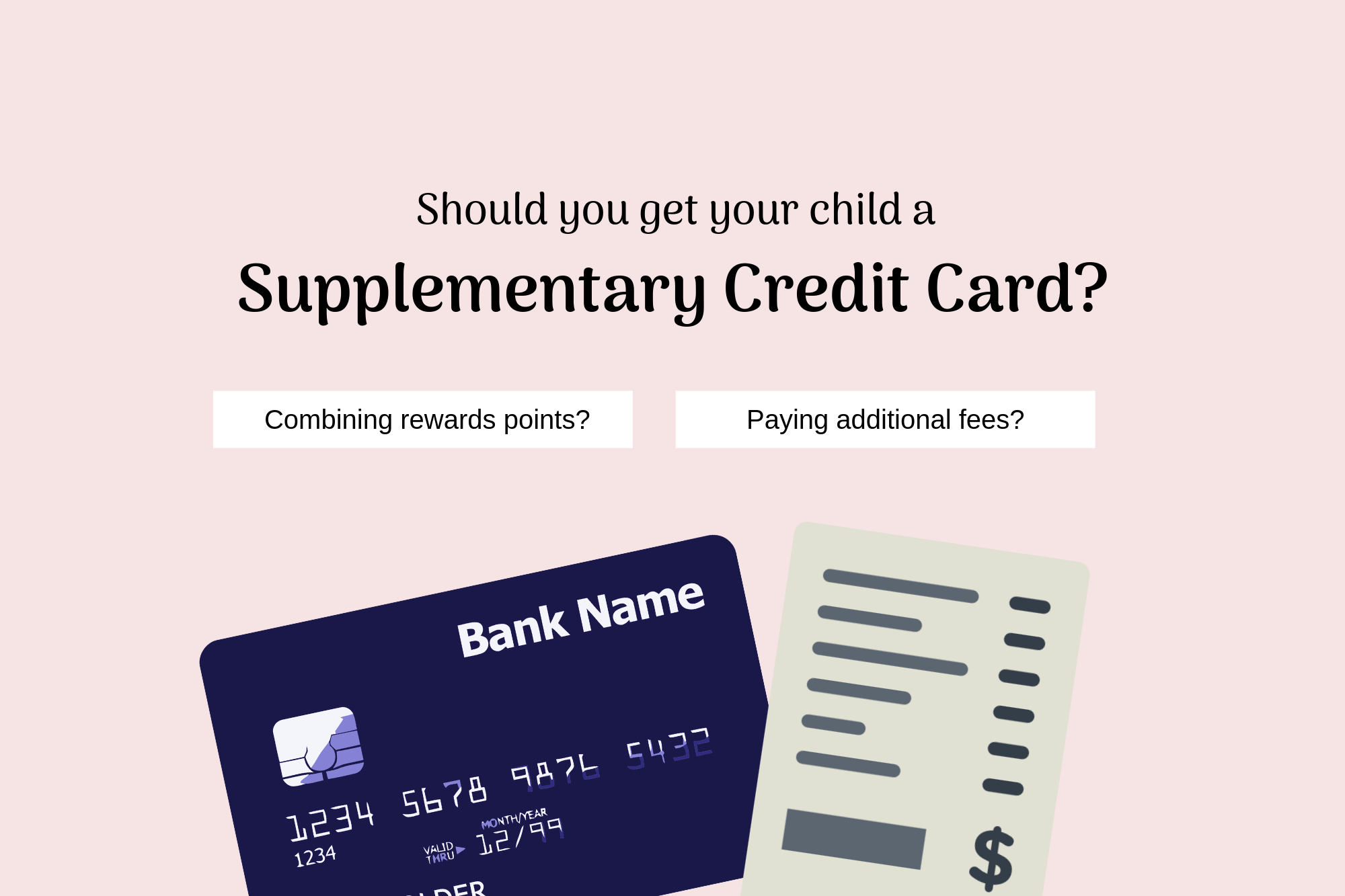Understanding The Pros And Cons Before Getting Your Child A Supplementary Charge card


Supplementary credit cards, sometimes also known as add-on cards, allow primary charge card holders to assign one more charge card for that use of themselves or friends, with the supplementary charge cards sharing the same credit limit because the primary charge card they are associated with.
Since those younger than 18 will not be able to apply for credit cards that belongs to them, parents trying to get an additional card and assigning it to their children could be a useful method of allowing their children to savor some of the convenience and benefits of credit cards.
Before parents obtain a supplementary card for his or her children, here are some pros and cons they should know about and consider.
Pro #1: Combining Reward Points
Certain credit cards allow cardholders to combine reward points. This means that the primary credit card holder actually earns reward points when the supplementary cardholders spend money. It will help to hurry your point accumulation, and hence allow you to redeem rewards faster as well.
As an example, we use Citibank's Rewards Calculator to discover what you can earn in reward points from giving your son or daughter an additional card. Let's imagine you set the loan limit per month at the minimum $1,000, and your child spends $100 monthly on each one of the following aspects:

You would have earned an extra 38,400 points in your children's expenses – this is actually the equivalent of a $90 cash rebate, or $91 price of points which you can use to pay redeem at participating merchants.
Pro #2: Having Extra Funds On Hand In Case Of Emergencies
If your son or daughter doesn't have a source of standard income, there is a risk that he or she might not have enough within the checking account to tide over emergencies, and this is time that a credit card will come in handy.
Also, if your little one is heading overseas for longer periods (such as completing his/her studies overseas, happening exchange, summer school, grad trip), then a supplementary credit card will definitely come in handy. It's one of the best all-purpose payment methods, accepted widely abroad. It's also helpful for certain expenses such as renting cars and apartments, which typically don't accept debit cards as a type of payment.
Having a credit card available while travelling also allows your son or daughter to possess several form of payment should a larger purchase be needed. This is especially essential in times of emergencies, where your son or daughter can't pay using the limited cash they have available, or perhaps in their savings accounts.
By carrying a credit card for purchases instead of an atm card, you are able to report and terminate your child's card without false purchases inside your bank account if fraud ever occurs.
Pro #3: Ability To Use Apps And Services That need Credit Cards
With a supplementary card, your child can use credit cards to register for apps and services that need cashless payment systems. Including taking Grab, booking movie tickets, and more. In addition, there are many discounts and promotions that can simply be enjoyed with charge cards. Having a supplementary charge card gives your child more options and the capability to find out how they can stretch their dollars.
Pro #4: Monitor Your Kids' Spending
For people who realise that their child is suddenly spending lots of money, or never seems to save anything every month, getting him or her an additional charge card could be a great way that you should track his/her expenses in the credit card bill.
As mentioned earlier, your child might have added the supplementary credit card because the payment way of apps for example Grab and Taobao. By looking at your credit card bill, you might find out that the child is spending a few $ 100 each month on ride-hailing, food deliveries, and online shopping with the supplementary charge card.
If you are concerned about the big-ticket expenses, after that you can have a talk with your child to uncover the reasons for them, in addition to how you can work together to reduce around the expenses. For example, he or she could be frequently taking Grab because waking up late for school has turned into a (bad) habit that even your son or daughter did not realise.
Your child may also be very likely to become careful of his or her expenditure, understanding that you are able to keep track of how much and just what they are spending on.
Pro #5: Researching Charge cards Early
Last but not least, your son or daughter gets a better understanding of how credit and loans work before he or she is designed with a primary credit card. When done right, your son or daughter is more informed about maximizing the benefits of utilizing a charge card, without having to put her or himself vulnerable to being a 'credit card slave'.
Con #1: Paying Additional Fees
As fantastic like a supplementary charge card may seem after you have browse the pros of getting one, do take note that you might have to pay for extra fees to obtain supplementary cards for the child. Some banks give fee waivers, but only for the 1st or 2nd cards.
See the tables below for examples of different ways fees are charged to Citibank and UOB charge cards. Citibank provides a 1st year waiver on all cards, then charges a yearly fee for certain cards:
| Citibank Credit Cards | Annual Fee |
| Citi Prestige Card | Free for life |
| Citi PremierMiles Visa / American Express(R) Card | Free for life |
| Citibank Rewards Visa Signature | $96.30 |
| Citibank Rewards WORLD MasterCard | $96.30 |
| Citibank Platinum Visa | $85.60 |
| Citibank Clear Platinum Card | $85.60 |
| Citi Cash Back Visa Signature | $96.30 |
| Citi Cash Back WORLD MasterCard | $96.30 |
| Citibank Partner Cards | |
| Citibank M1 Platinum Visa | $96.30 |
| Citibank SMRT Visa Platinum (2-year annual fee waiver) | $96.30 |
On the other hand, UOB completely waives the fees on your first and/or second supplementary cards, after which charges a yearly fee for subsequent cards:
| UOB Supplementary Charge card Fees | ||
| Supplementary Card | First/Second Card(s) | Subsequent Cards (Inclusive of GST) |
| UOB Lady's Solitaire Metal Card | No annual fee on the first and second cards | S$288 |
| UOB Lady's Solitaire Card | No annual fee around the first and second cards | S$192.60 |
| UOB PRVI Miles Platinum American Express(R) Supplementary Card | No annual fee on the first and second cards | S$128.40 |
| UOB PRVI Miles Visa Supplementary Card | No annual fee around the third and fourth cards | S$128.40 |
| UOB PRVI Miles World MasterCard Supplementary Card | No annual fee on the first and second cards | S$128.40 |
| UOB Visa Signature Supplementary Card | No annual fee on the first card | S$107 |
| UOB One Supplementary Card | No annual fee around the first card | S$96.30 |
| UOB Preferred Platinum Supplementary Card | No annual fee on the first card | S$96.30 |
| UOB Preferred Platinum Visa Supplementary Card | No annual fee on the first card | S$96.30 |
| UOB Lady’s Platinum Supplementary Card | No annual fee around the first card | S$96.30 |
| SingTel-UOB Platinum Supplementary Card | No annual fee on the first card | S$96.30 |
| Metro-UOB Platinum Supplementary Card | No annual fee on the first card | S$96.30 |
| UOB Professionals Platinum Supplementary Card | No annual fee around the first card | S$96.30 |
| UOB UnionPay Platinum Supplementary Card | No annual fee around the first card | S$96.30 |
| UOB JCB Platinum Supplementary Card | No annual fee on the first card | S$32.10 |
| UOB YOLO Supplementary Card | No annual fee around the first card | S$96.30 |
You can click on the next websites to be able to look into the charges and fees applicable for other financial institutions' supplementary cards:
– DBS Supplementary Card Fees
– CIMB Supplementary Card Fees (waived for all cards since 23 November 2021)
– OCBC Supplementary Card Fees
– Maybank Supplementary Card Fees (free for all)
– BOC Supplementary Card Fees (SGD 95 per year)
Con #2: Unintentionally Creating A “Spend First” Mentality Towards Money
Using a credit card is borrowing money from the bank to cover your expenses, while using debit cards is paying with money that's already inside your bank account.
There is a possibility that your child can get too accustomed to spending first before you spend money, particularly if you are helping them to pay for all of their supplementary card bills. Whenever your child receives a personal charge card in the future, he or she may keep while using charge card to cover all their expenses and end up forgetting that they have to repay their bills with added interest.
One method for you to prevent this from happening is to enforce that your child pay back some, or even all their supplementary card bills, within a certain period of time. It teaches these to think hard before swiping their card.
Manage The Downsides To Still Reap The Benefits
As with all tools, supplementary cards have really attractive benefits, with downsides you need to be aware of and carefully manage. By good financial education and shut communication together with your child, both of you can benefit from the better if a credit card has to provide, while avoiding the pitfalls.






